动词过去式复习课
复习动词过去式听课课件

9. Last week I _w__e_n__t_ (go) to the aquarium .
I _s_a_w__ (see) some sharks and I _t_o_o__k (take) some
photos
10. Therew__e_r_e__ (be) some really smart seals when
What did … do last weekend?
went to the beach (played badminton)
W visited aunt / grandma
What did you do last weekend? did my homework / sports
we visited the aquarium .
11. Yesterday I _h_a__d_ (have) some pizza ,and _a_t_e__
(eat) some ice cream .
12. I h__u_n__g_ (hang) out with my friend yesterday evening .And I _b__o_u__g_h_t_ (buy) some books along
Go over simple past tense
淳于中学 张爱玲
Learning Aims:
• In this class we’ll go over simple past tense • 1.write the words of Unit5 to Unit8 • 2.Go over the past tense. • 3.Do the exercises. • 4.Writing .
_H_o_w_ _l_on_g_ _d_id_ she _s_t_ay__ there? 4.There was some orange in the cup.(变一 般疑问句)
小学英语六年级一般过去式复习课件PPT

1.Where did you go three days ago ?(去佛山) 2. Where did she go three days ago ? 3. Where did he go ? (去书店) 4. Where did they go? 5. Where did Sally go? (去学校) 6. Where did Mr. Liu go?
5) ---Where __B _ you ___ on your holiday? A. did do B. did go C. do go D. do did
Please answer the questions. (回答问题) 1)Where did you go last holiday? __I w_e_nt _to_th_e _lib_rar_y.______ 2)How did Funny go to the park? _F_u_nn_y _we_nt_to_th_e_pa_rk_o_n _foo_t._
其他: 1. Was …?
Yes,…was. / No, …wasn’t. 如: Was it sunny yesterday? 1) Was the weather rainy yesterday? 2) Was Miss Tang excited last week? 3) Was Huang Junjie bored?
其他: 1.Did ……+动词(原形)?
Yes,…did. / No, …didn’t. 如: Did you play football yesterday? 1) Did you________ the room? 2) Did she ______ swimming yesterday? 3) Did your leg hurt last Monday?
一般过去时复习课 六年级
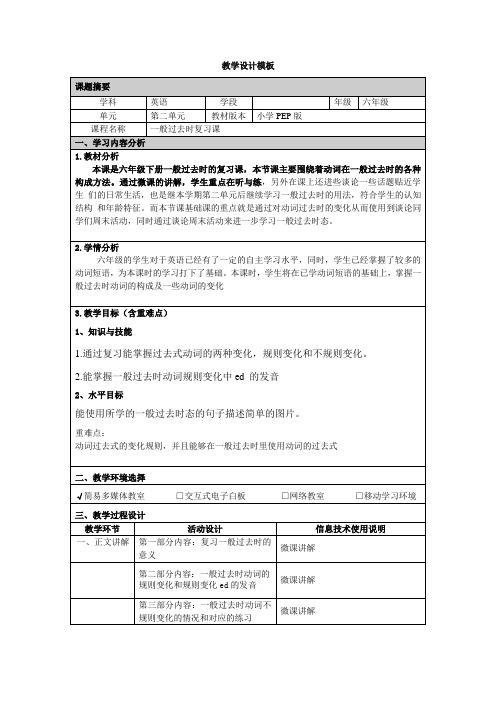
微课讲解
第二部分内容:一般过去时动词的规则变化和规则变化ed的发音
微课讲解
第三部分内容:一般过去时动词不规则变化的情况和对应的练习
微课讲解
四、教学评价设计
1.评价方式与工具
√课堂提问√书面练习 □制作作品 □测验 □其它
2.评价量表内容(测试题、作业描述、评价表等)
1.教材分析
本课是六年级下册一般过去时的复习课,本节课主要围绕着动词在一般过去时的各种构成方法。通过微课的讲解,学生重点在听与练,另外在课上还进些谈论一些话题贴近学生们的日常生活,也是继本学期第二单元后继续学习一般过去时的用法,符合学生的认知结构和年龄特征。而本节课基础课的重点就是通过对动词过去时的变化从而使用到谈论同学们周末活动,同时通过谈论周末活动来进一步学习一般过去时态。
写出下列动词的过去式
study play clean stop wash get take see
五、备注
技术环境下课堂教学管理思路、可能存在的教学意外及相应的应急预案等。
备注:本模板仅供参考,参训教师可根据实际情况,自行修改创新。
2.能掌握一般过去时动词规则变化中ed的发音
2、水平目标
能使用所学的一般过去时态的句子描述简单的图片。
重难点:
动词过去式的变化规则,并且能够在一般过去时里使用动词的过去式
二、教学环境选择
√简易多媒体教室 □交互式电子白板 □网络教室 □移动学习环境
三、教学过程设计
教学环节
活动设去式的变化规则并且能够在一般过去时里使用动词的过去式二教学环境选择简易多媒体教室交互式电子白板网络教室移动学习环境三教学过程设计教学环节活动设计信息技术使用说明一正文讲解第一部分内容
动词的过去式知识点

动词的过去式知识点动词的过去式是英语语法中的基本知识点之一。
正确地运用过去式可以帮助我们准确地表达过去发生的动作或事件。
在本篇文章中,我们将探讨动词的过去式的形成规则以及一些常见的不规则动词的过去式形式。
一、动词过去式的形成规则大部分英语动词的过去式形式是通过在动词原形后加上-ed或-d来构成的。
具体规则如下:1. 对于以辅音字母+y结尾的动词,变y为i,再加-ed。
例如:study → studied, try → tried。
2. 对于以“辅音字母+元音字母+辅音字母”结尾的重读闭音节动词,双写最后一个辅音字母,再加-ed。
例如:stop → stopped, plan → planned。
3. 对于以“元音字母+辅音字母+e”结尾的动词,直接去掉e,再加-ed。
例如:hope → hoped, dance → danced。
4. 对于以一个辅音字母结尾的重读闭音节动词,双写最后一个辅音字母,再加-ed。
例如:sit → sat, run → ran。
5. 对于其他动词,直接加上-ed即可。
例如:work → worked, play → played。
需要注意的是,过去式的构成规则有很多例外和特殊情况,下面我们将介绍一些常见的不规则动词过去式形式。
二、常见的不规则动词过去式形式1. be的过去式形式为was(用于第一人称单数)和were(用于其他所有人称和数)。
例如:I was happy yesterday.(昨天我很开心。
)They were at the party last night.(他们昨晚在聚会上。
)2. have的过去式形式为had。
例如:She had a nice trip to Paris.(她曾经去巴黎旅行过。
)3. do的过去式形式为did。
例如:He did his homework yesterday.(他昨天完成了作业。
)4. go的过去式形式为went。
动词过去时态复习
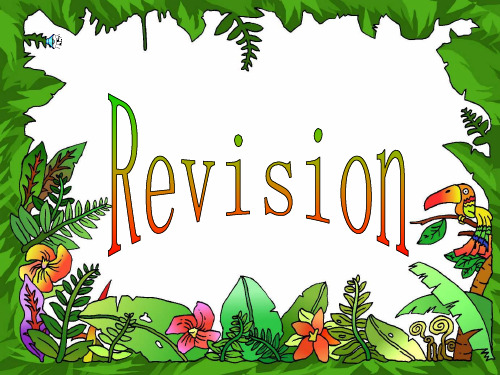
结构: 主语+动词过去式 常见时间状语: yesterday, yesterday morning (afternoon, evening…) last night (week, month, year…) two days ago, a week ago, three years ago… in 1990, (in 1998…) this morning, on my fifth birthday,
三、变换句式。
一)变一般疑问句。
1.We visited our friends last night.
Did you visit your friends last night?
2.My mother made a birthday cake for me last Sunday.
d your mother make a birthday cake for you last Sunday?
washed (wash) my coat myself two 12. I __________ hours ago.
13. When I ______(wake) up in the morning, I woke _______(find) a package next to my bed. found 14.They ______(swim) in a river when they swam _____(are) children. were 15.Linda’s parents _______(send) her a new sent scooter. 16.Bill ______(give) a speech yesterday. gave
一般过去时复习ppt上课讲义

行为动词在一般过 去时中的应用:
每天早餐我吃鸡蛋和牛奶。 I _h_a_ve_ eggs and milk for breakfast every day .
昨天,早餐我吃面条。 I _h_a_d_ noodles for breakfast yesterday
A. write B. writed C. wrote
2. Everything __B_ ready before
Father came.
A. were B. was
C. is
3.He always __A___me last term(学期).
A. helped
B. helps C. help
4. —Tim ___B___ the math test last weekend. What about
study — studied
5.不规则变化.(见不规则动词表P142)
规则动词过去式-ed的发音
1.在以清辅音结尾的规则动词后,
-ed读作/ t / worked
/w3:k/t/
2.在以浊辅音或元音结尾的规则动词后
, -ed读作/d /
lived /lIv d//
play ed /pleI d//
3.在以/t/或/d/结尾的规则动词后,
-ed读作/Id /
visit ed /’vIzIt I/d/
finished /t/ enjoyed /d/ shouted /Id/ moved /d/
helped /t/ wanted /Id/ called /d/ needed /Id/
动词过去式变化及练习辅导

动词过去式变化及练习辅导动词过去式变化规则动词的过去式变化主要取决于它的词形、时态和语气。
一般情况下,动词过去式以-ed或-d结尾。
在下面的表格中,我们将列出一些常见的过去式变化规则:练辅导练是研究动词过去式的重要环节。
下面是一些练题,帮助你巩固所学的知识:1. 把下面的动词变为过去式:- talk:- play:- study:- stop:- swim:2. 根据句意填入适当的动词的过去式:- Yesterday, she _____ (walk) to school.- They _____ (watch) a movie last night.- He _____ (buy) a new car two weeks ago.- We _____ (eat) dinner at a fancy restaurant yesterday.- My friend _____ (write) a book last year.3. 请用适当的动词的过去式填空:- I _____ (visit) my grandparents last weekend.- They _____ (clean) the house before the guests arrived.- She _____ (dance) beautifully at the party.- We _____ (play) soccer in the park yesterday.- He _____ (forget) his keys at home this morning.4. 翻译下列句子:- They cooked dinner yesterday.- 你上个月去了哪里?- 我昨天见到了我的老师。
- 他们跳舞得很开心。
- 上个星期他们放假了。
通过完成以上练,你可以更好地掌握动词过去式的变化规则和用法。
继续多加练,你的语法水平会有明显的提高!参考答案1. 把下面的动词变为过去式:- talk: talked- play: played- study: studied- stop: stopped- swim: swam2. 根据句意填入适当的动词的过去式:- Yesterday, she walked to school.- They watched a movie last night.- He bought a new car two weeks ago.- We ate dinner at a fancy restaurant yesterday.- My friend wrote a book last year.3. 请用适当的动词的过去式填空:- I visited my grandparents last weekend.- They cleaned the house before the guests arrived.- She danced beautifully at the party.- We played soccer in the park yesterday.- He forgot his keys at home this morning.4. 翻译下列句子:- They cooked dinner yesterday. (他们昨天做饭了。
动词的过去式
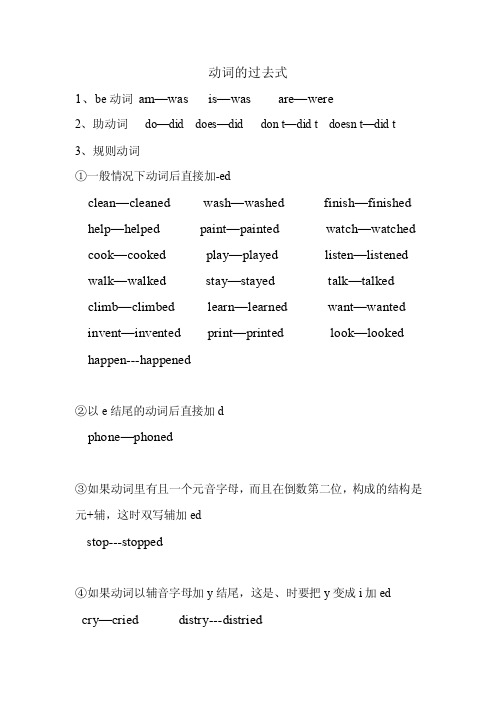
动词的过去式
1、be动词am—was is—was are—were
2、助动词do—did does—did don t—did t doesn t—did t
3、规则动词
①一般情况下动词后直接加-ed
clean—cleaned wash—washed finish—finished help—helped paint—painted watch—watched cook—cooked play—played listen—listened walk—walked stay—stayed talk—talked climb—climbed learn—learned want—wanted invent—invented print—printed look—looked happen---happened
②以e结尾的动词后直接加d
phone—phoned
③如果动词里有且一个元音字母,而且在倒数第二位,构成的结构是元+辅,这时双写辅加ed
s top---stopped
④如果动词以辅音字母加y结尾,这是、时要把y变成i加ed cry—cried distry---distried
4、不规则动词
eat—ate have—had has—had
buy—bought run—ran wear—wore fall—fell make—made see—sew go—went get—got say—said take—took break—broke ride---rode cut---cut put-----put win---won learn----learnt。
复习动词过去式(教案)-2023-2024学年英语六年级下册
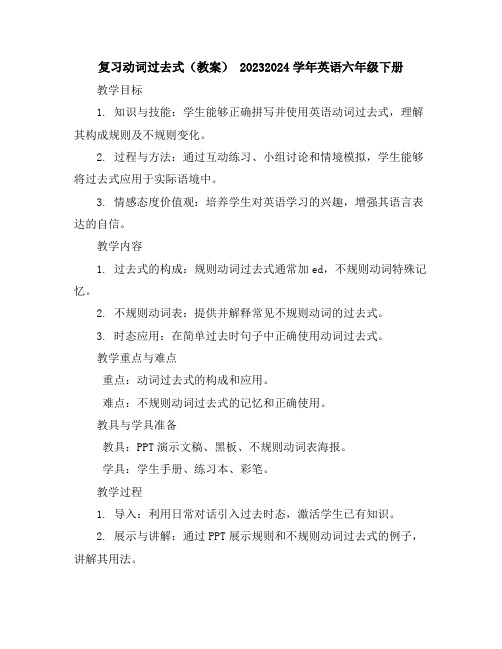
复习动词过去式(教案) 20232024学年英语六年级下册教学目标1. 知识与技能:学生能够正确拼写并使用英语动词过去式,理解其构成规则及不规则变化。
2. 过程与方法:通过互动练习、小组讨论和情境模拟,学生能够将过去式应用于实际语境中。
3. 情感态度价值观:培养学生对英语学习的兴趣,增强其语言表达的自信。
教学内容1. 过去式的构成:规则动词过去式通常加ed,不规则动词特殊记忆。
2. 不规则动词表:提供并解释常见不规则动词的过去式。
3. 时态应用:在简单过去时句子中正确使用动词过去式。
教学重点与难点重点:动词过去式的构成和应用。
难点:不规则动词过去式的记忆和正确使用。
教具与学具准备教具:PPT演示文稿、黑板、不规则动词表海报。
学具:学生手册、练习本、彩笔。
教学过程1. 导入:利用日常对话引入过去时态,激活学生已有知识。
2. 展示与讲解:通过PPT展示规则和不规则动词过去式的例子,讲解其用法。
3. 小组活动:学生分小组,互相练习过去式,讨论不规则动词的变化。
4. 情境模拟:创设情境,让学生运用过去式进行角色扮演。
板书设计板书将包含动词过去式的构成规则、不规则动词列表以及例句。
使用不同颜色的粉笔突出重点和难点。
作业设计必做题:完成练习册上的过去式填空题。
选做题:编写一段包含至少5个过去式的英文小故事。
课后反思教师应反思教学中学生的参与度和理解程度。
根据学生的反馈调整教学方法,确保每个学生都能掌握过去式的使用。
此教案旨在为教师提供一个全面且结构化的教学计划,以帮助学生复习并掌握动词过去式。
通过综合运用不同的教学方法和工具,教案旨在提高学生的英语语法能力,并增强他们对英语学习的兴趣。
课后反思环节鼓励教师根据学生的实际情况调整教学策略,确保教学效果的最大化。
重点细节:教学过程教学过程是整个教案中最为关键的部分,因为它直接关系到学生能否有效地接收、理解和运用所学知识。
在这一部分,教师需要精心设计每一个环节,确保教学内容能够有序、高效地传达给学生,并且能够激发学生的学习兴趣,促进他们的积极参与。
小学四年级教案设计学习常用动词的过去式

小学四年级教案设计学习常用动词的过去式【导语】在英语学习中,了解常用动词的过去式是非常重要的。
通过学习过去式,学生可以更好地理解和运用英语语法。
本文将为小学四年级的教师提供一份教案设计,帮助学生学习常用动词的过去式。
一、教学目标1. 学生能够理解常用动词的过去式的概念。
2. 学生能够正确地使用常用动词的过去式进行交流。
3. 学生能够在实际生活中运用所学的过去式进行表达。
二、教学准备1. 教师准备一份包含常用动词的过去式的名单。
2. 教师准备一些相关的图片或者实物,用于呈现动词的过去式。
三、教学过程1. 导入教师可以通过展示一些图片或者实物,引出常用动词的过去式的概念。
例如,教师可以展示一张“eat”的图片,然后问学生“昨天你吃了什么?”引导学生回答“昨天我吃了苹果。
”然后引出过去式“ate”。
2. 学习常用动词的过去式教师将常用动词的过去式的名单分发给学生,并解释每个动词的过去式的规则。
教师可以使用举例的方式,让学生在实际例子中理解这些规则。
例如,教师可以说“go的过去式是went,我昨天去了学校。
”然后让学生跟读这句话。
3. 游戏练习教师可以设计一些游戏来巩固学生对常用动词过去式的掌握。
例如,教师可以说出一个动词的原形,让学生迅速说出过去式。
可以根据学生的掌握情况,逐渐增加难度。
4. 句子填空教师准备一些句子,在句子中留出动词的过去式的位置,让学生填入正确的过去式。
教师可以使用图片辅助学生理解句子的意思。
例如,教师可以说“昨天我 ____ (play) 篮球。
”然后让学生填入正确的过去式“played”。
5. 对话练习教师分组要求学生进行对话练习,让学生运用所学的过去式进行真实的对话。
教师可以提供一些话题,例如“昨天你做了什么?”或者“你和朋友一起干了什么?”鼓励学生用完整的句子进行交流。
6. 拓展活动教师可以引导学生进行一些拓展活动,加深对常用动词过去式的理解和运用。
例如,教师可以让学生分组设计一个小剧场表演,让每个人都用到过去式。
一般过去时复习课教案
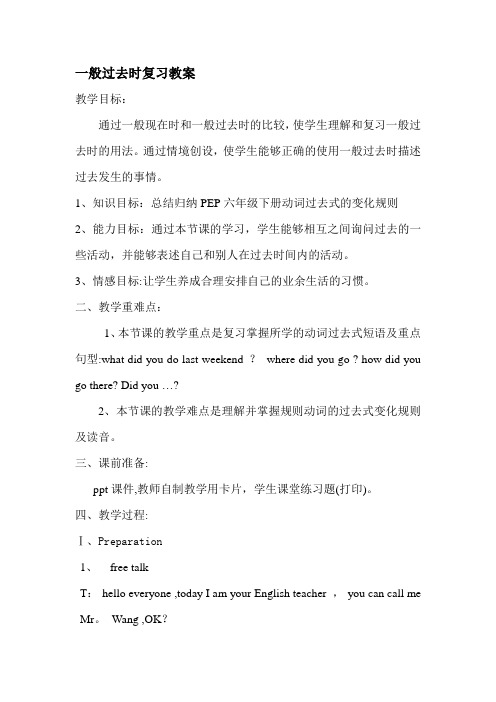
一般过去时复习教案教学目标:通过一般现在时和一般过去时的比较,使学生理解和复习一般过去时的用法。
通过情境创设,使学生能够正确的使用一般过去时描述过去发生的事情。
1、知识目标:总结归纳PEP六年级下册动词过去式的变化规则2、能力目标:通过本节课的学习,学生能够相互之间询问过去的一些活动,并能够表述自己和别人在过去时间内的活动。
3、情感目标:让学生养成合理安排自己的业余生活的习惯。
二、教学重难点:1、本节课的教学重点是复习掌握所学的动词过去式短语及重点句型:what did you do last weekend ?where did you go ? how did you go there? Did you …?2、本节课的教学难点是理解并掌握规则动词的过去式变化规则及读音。
三、课前准备:ppt课件,教师自制教学用卡片,学生课堂练习题(打印)。
四、教学过程:Ⅰ、Preparation1、free talkT:hello everyone ,today I am your English teacher ,you can call me Mr。
Wang ,OK?S:: OK 。
T:Are you ready for your English class ?S: Yes!T: OK,class begins !师生问候2、Let's chantT:Today is June 2nd,yesterday was June 1st,The Children's Day.Yesterday I was very happy。
I went to shanghai ,I met Haibao there ,we were good friends ,we sang and danced together ,will you sing with us ?S: Yes, I will .师生一起唱自编歌谣ChantHaibao,Haibao,Haibao, Haibao,how are you ?Haibao,Haibao, Haibao,Haibao,how are you ?I’m fine ,I’m fine ,thank you ,thank you very much!Haibao,Haibao,Haibao,Haibao, how are you ?Haibao,Haibao,Haibao,Haibao,how are you ?I’m fine ,I’m fine ,thank you ,thank you very much!Ⅱ、PresentationT:Good job ! yesterday Haibao was really busy ,look here ,what did he do yesterday ?出示幻灯片.(1)海宝唱歌跳舞(2)海宝踢足球(3)海宝读书T: Haibao did many things yesterday ,What about you ?what did you do yesterday ?出示幻灯片(what did you do yesterday )找生回答,如果不会,接着出示下一张幻灯片,maybe these words can help you !T:ok,very good!I think you are very helpful。
初中动词复习的教案

初中动词复习的教案教学目标:1. 掌握动词的基本形式和用法;2. 能够正确运用动词表达动作和状态;3. 提高学生的语法水平和语言运用能力。
教学内容:1. 动词的基本形式:原形、过去式、过去分词、现在分词;2. 动词的用法:表示动作、表示状态、动词短语;3. 动词的时态:一般现在时、一般过去时、一般将来时。
教学步骤:一、导入(5分钟)1. 引导学生回顾动词的基本形式和用法;2. 提问学生,检查他们对动词的掌握情况。
二、讲解动词的基本形式(10分钟)1. 讲解动词的原形、过去式、过去分词、现在分词的构成规则;2. 通过例句展示动词的不同形式在句子中的用法。
三、动词的用法(10分钟)1. 讲解动词表示动作和状态的用法;2. 举例说明动词短语的构成和用法;3. 让学生进行分组练习,用动词造句,表达动作和状态。
四、动词的时态(10分钟)1. 讲解一般现在时、一般过去时、一般将来时的构成和用法;2. 通过例句展示不同时态的动词在句子中的用法;3. 让学生进行练习,用不同时态的动词造句。
五、复习巩固(10分钟)1. 出示一些动词,让学生判断它们的词性;2. 给出一些句子,让学生找出其中的动词,并说明它们的用法;3. 让学生用所学的动词知识,编写一段小故事。
六、总结与作业(5分钟)1. 对本节课的内容进行总结,强调动词的重要性和用法;2. 布置作业:用所学的动词知识,写一篇短文。
教学评价:1. 课后收集学生的作业,检查他们对动词知识的掌握情况;2. 在下一节课开始时,让学生进行 verb quiz,测试他们对动词的掌握程度;3. 观察学生在课堂上的表现,了解他们对动词知识的理解和运用能力。
教学反思:通过本节课的教学,发现学生在动词的用法和时态方面存在一些问题,需要在今后的教学中加强讲解和练习。
同时,要注重培养学生的语言运用能力,让他们能够在实际语境中正确运用动词。
(精品)六年级下册英语复习课动词过去式

不规则变化
take took see saw read read
is/am was are were give gave
你能发现什么 规律?
cook----cooked watch---watched visit----visited talk---talked
动词原形变成过去 式直接在动词后加
ed
Let's practice
1.One day, a dog__B__ to a meat shop. A.go B.went C.
going
B 2. I ___A_ TV on last Saturday. A. watch B. watched C.watches
3.She____clothes yesterday evening. A. washed B. washes C. wash
Last Sunday,Peter and his mother went to the Space Museum.
表示过去的时间状语:
one day, last Sunday, long ago,
yesterday...
go ----went do ----did
have ------had make----made
C
4.My mother____me to Beijing last year. A.takes B.taking C. took
A
5.A man___about the film. A.talked B.talk C. talking
Listen to the music
《Yesterday once more》
When I was young I'd listen to the radio waiting for my favorite songs when they played I'd sing along It made me smile Those were such happy times And not so long ago
(精品)六年级下册英语复习课动词过去式教案
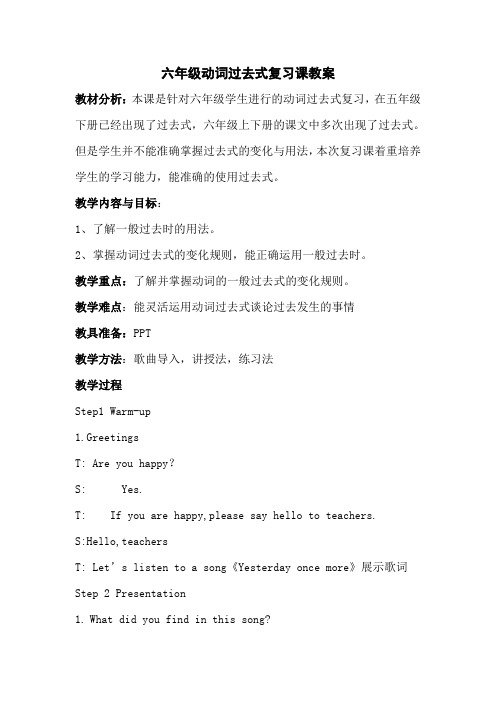
六年级动词过去式复习课教案教材分析:本课是针对六年级学生进行的动词过去式复习,在五年级下册已经出现了过去式,六年级上下册的课文中多次出现了过去式。
但是学生并不能准确掌握过去式的变化与用法,本次复习课着重培养学生的学习能力,能准确的使用过去式。
教学内容与目标:1、了解一般过去时的用法。
2、掌握动词过去式的变化规则,能正确运用一般过去时。
教学重点:了解并掌握动词的一般过去式的变化规则。
教学难点:能灵活运用动词过去式谈论过去发生的事情教具准备:PPT教学方法:歌曲导入,讲授法,练习法教学过程Step1 Warm-up1.GreetingsT: Are you happy?S: Yes.T: If you are happy,please say hello to teachers.S:Hello,teachersT: Let’s listen to a song《Yesterday once more》展示歌词Step 2 Presentation1.What did you find in this song?生作答,引出一般过去时(生试着概括,师小结)2.(坐标图展示过去时间的概念)出示连线练习,让学生加以区分一般现在时和一般过去时I go to school last Sunday .We went to Chenzhou every morning.3.一般过去时:表示过去某个时间发生的动作或存在的状态,常和表示过去的时间状语连用。
4.给出两个六年级下册课本中的句子,让生找出时间状语。
如:one day,last Sunday, long ago,yesterday ...Step 3 动词变过去式的规则1、出示第一环节出现的动词的原形和过去式的对比生自主总结第一条规律不规则变化的动词师再呈现六年级下册出现过的不规则变化的动词原形和过去式的对比。
2、出示直接在动词后面加-ed的规则变化动词,生认读,仔细观察,找出这一变化规则。
英语人教版九年级全册动词过去式专项复习
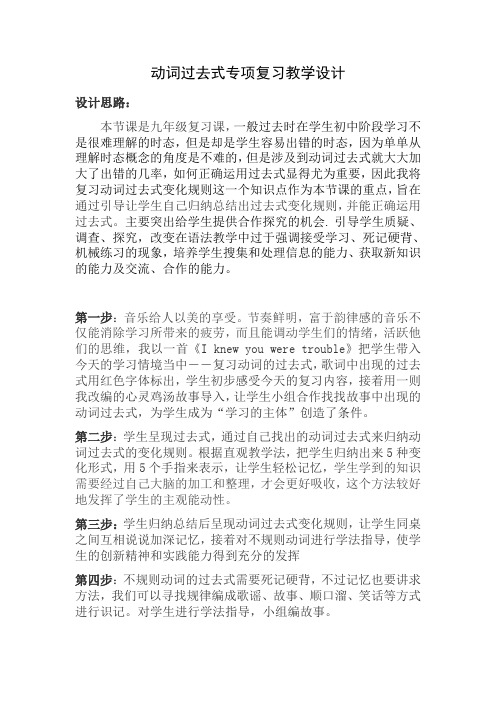
动词过去式专项复习教学设计设计思路:本节课是九年级复习课,一般过去时在学生初中阶段学习不是很难理解的时态,但是却是学生容易出错的时态,因为单单从理解时态概念的角度是不难的,但是涉及到动词过去式就大大加大了出错的几率,如何正确运用过去式显得尤为重要,因此我将复习动词过去式变化规则这一个知识点作为本节课的重点,旨在通过引导让学生自己归纳总结出过去式变化规则,并能正确运用过去式。
主要突出给学生提供合作探究的机会. 引导学生质疑、调查、探究,改变在语法教学中过于强调接受学习、死记硬背、机械练习的现象,培养学生搜集和处理信息的能力、获取新知识的能力及交流、合作的能力。
第一步:音乐给人以美的享受。
节奏鲜明,富于韵律感的音乐不仅能消除学习所带来的疲劳,而且能调动学生们的情绪,活跃他们的思维,我以一首《I knew you were trouble》把学生带入今天的学习情境当中――复习动词的过去式,歌词中出现的过去式用红色字体标出,学生初步感受今天的复习内容,接着用一则我改编的心灵鸡汤故事导入,让学生小组合作找找故事中出现的动词过去式,为学生成为“学习的主体”创造了条件。
第二步:学生呈现过去式,通过自己找出的动词过去式来归纳动词过去式的变化规则。
根据直观教学法,把学生归纳出来5种变化形式,用5个手指来表示,让学生轻松记忆,学生学到的知识需要经过自己大脑的加工和整理,才会更好吸收,这个方法较好地发挥了学生的主观能动性。
第三步:学生归纳总结后呈现动词过去式变化规则,让学生同桌之间互相说说加深记忆,接着对不规则动词进行学法指导,使学生的创新精神和实践能力得到充分的发挥第四步:不规则动词的过去式需要死记硬背,不过记忆也要讲求方法,我们可以寻找规律编成歌谣、故事、顺口溜、笑话等方式进行识记。
对学生进行学法指导,小组编故事。
第五步:小试牛刀的练习,让学生写出一些动词的过去式,用动词的适当形式填空以此巩固前面的内容,让学生有成功的体验。
过去式复习课 ppt课件

-I’ve got a stomach ache. -I’ve got a toothache. -I’ve got a fever. -I’ve got a cold. -I’ve got a headache.
填填过去式,读一读
see go eat fall over fall off come win buy take -
My friend -Amy
Did she go to America ? Did she see lots of mountains ? Did she drink some water? Did she buy the toy?
No, she didn’t.
She played the flute.
中国
英国
•四大发明
Chinese people invented
paper. Chinese people invented printing.
An English invented this bicycle in 1839.
•神笔马良故事
Maliang was a good boy. Maliang had a magic paintbrush.
Review lesson 过去式
少先路小学 Miss zhou
Yesterday 昨天
Last year/week 去年/上周(表示过去)
你做了什么?
去了哪里?
What did you do?
Where did you go ?
什么时候回来?When did you come back?
精品资料
• 你怎么称呼老师?
• 如果老师最后没有总结一节课的重点的难点,你 是否会认为老师的教学方法需要改进?
六年级下册复习课-动词过去式 课件
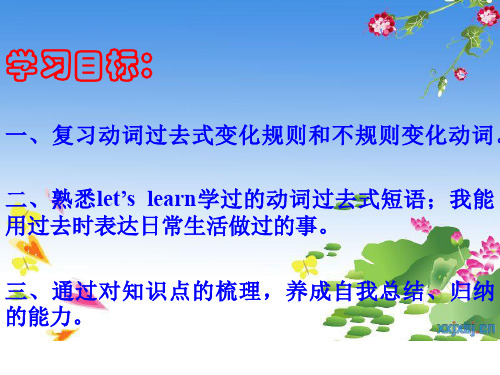
• 五:我能在备选栏中,找出相应的句子填在括号里。 • A.I rode a horse. B.I went to Xinjiang • C. Yes, I did. D. We went there last weekend. • E. It was good. F. Yes, I liked stars. •
• 一.watch –watched play-played help-helped……
• 二. love-loved hope-hoped like-liked dancedanced
• 三. stop-stopped plan-planned ……
• 四. worry-worried carry-carried cry-cried
•
A
B
C
• 2. We watched TV every day.
•A
B
C
• 3. Mike goes swimming last Sunday.
•
ABCLeabharlann • 4. I am short two years ago.
•
AB C
• 5. They go camping yesterday.
• AB
C
• 6. You rode a horse every week.
• AB
C
Step5:小结
Step6: Homework
今天的作业是用5-8句话写last weekend.
• B:
.
• A: Did you like it ?
• B:
.
• Step4:课堂测试题:
• 一:你能写出下列动词过去式吗?
• am
is
- 1、下载文档前请自行甄别文档内容的完整性,平台不提供额外的编辑、内容补充、找答案等附加服务。
- 2、"仅部分预览"的文档,不可在线预览部分如存在完整性等问题,可反馈申请退款(可完整预览的文档不适用该条件!)。
- 3、如文档侵犯您的权益,请联系客服反馈,我们会尽快为您处理(人工客服工作时间:9:00-18:30)。
I did a lot. I ______, ______,______ and I also_____.
It was really an unforgettable holiday.
Best wishes for you.
(
√
) 2. They have 3 days free.
√
) 5. Lily had an unforgettable(难忘的) holiday.
Lily’s Holiday
Zhoushan with __________ Lily went to _________ her parents over the Labour Day _______holiday ship .They went there by ____________.
Dear _______,
How are you? I want to talk about my holiday. I went to _______on my holiday . I went there by ____.
I did a lot. I ______, ______ , ______ and I also_____.
Hope you’ll have a happy holiday. Your,
What did Lily do in Zhoushan?
Lily
Dear Jingjing,
On Labour Day, we had a short holiday. It was three days. I went to Zhoushan with my parents. We went there by ship. My grandparents live in a beautiful village in Zhoushan . We visited them. We went to see the blue sea every day. We went swimming, went fishing and picked up shells. My grandma cooked good food for us every day. The seafood is freshபைடு நூலகம்and tasty. I like it. We took many pictures. I was excited.
A: How was your holiday? It was …… ( busy/ boring/ so-so/ nice/ good….) I went to ….. We went there by …..
B:
A: Where did you go on your holiday? B:
A: It’s …… ( near/ far from ) here. How did you go there?
read --- read buy -- bought sleep -- slept
Miss Wang’s Holiday
you holiday your did on go ( ? ) Where did youWhere go on your holiday?
West Lake.
Did you …… ?
went fishing picked up shells Theywent _________ swimming , _________ and __________.
Lily liked seafood _____ very much. And she took ________. many pictures It was really an unforgettable holiday.
cried studied
stopped planned
Let’s change eat --- ate
see --- saw hurt --- hurt
ride --- rode
go --- went
have --- had take --- took get --- got fall --- fell
B: A: What did you do there? B: We …… A: Sounds great.
Dear Jingjing, On Labour Day, we had a short holiday. It was three days. I went to Zhoushan with my parents. We went there by ship. My grandparents live in a beautiful village in Zhoushan . We visited them. We went to see the blue sea every day. We went swimming, went fishing and picked up shells. My grandma cooked good food for us every day. The seafood is fresh and tasty. I like it. We took many pictures. I was excited. Hope you’ll have a happy holiday. Your, Lily
Hope you’ll have a happy holiday. Your, Lily
Read and tick or cross.
(
May 1st
× ) 1. Labour Day is on October 1st.
(
(
× ) 3. Lily’s parents live in Zhoushan. ( ) 4. The seafood is dirty, so Lily didn’t like it. ×
go to a park
climb mountains
see a film
go fishing/ camping/ swimming/hiking
Love your life, enjoy your holiday!
Dear _______,
How are you? I want to talk about my holiday.
Visited, wanted, / id /, / id /, / id /.
watched
TV
played football
visited my grandparents
Can you read these words? Classify these words.( 给下列动词归类)
cooked jumped stopped danced laughed
It was really an unforgettable holiday. Best wishes for you.
Yours,
______
Word Bank:
take pictures
ride a horse/bike
eat fresh food
go for a picnic
buy gifts
stayed
studied
used
needed
cried
started
lived
planned
重读闭音节结尾 的词,双写最后 一个字母再加ed
+ed
cooked jumped
不发音e结尾+d
辅音字母+y结尾,
把y变i加ed
laughed stayed needed started
danced
used lived
Dear Jingjing,
On Labour Day, we had a short holiday. It was three days. I went to Zhoushan with my parents. We went there by ship. My grandparents live in a beautiful village in Zhoushan . We visited them. We went to see the blue sea every day. We went swimming, went fishing and picked up shells. My grandma cooked good food for us every day. The seafood is fresh and tasty. I like it. We took many pictures. I was excited.
Yours, ______
Word Bank:
take pictures ride a horse/bike
eat fresh food go for a picnic
buy gifts go to a park
climb mountains see a film
go fishing/ camping/ swimming/hiking
How did, did you went the West Lake? you, How, to, to the, West Lake, go (?)
Did you go there by…?
by taxi
by plane
by train
by bus
by bike
by car
by subway
your holiday
My holiday
washed my clothes
